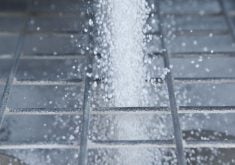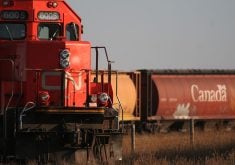GUELPH, Ont. — Some farmers decide to generate electricity solely for economic gain, but Korb Whale said it was strictly a farming decision for him and his parents.
Selling power to the grid allowed this seventh generation Ontario dairy producer to steer the future of the farm in a direction that better matched the family’s philosophy about how the farm fits into the surrounding world.
“Our family has always believed in the whole notion of sustainable agriculture, but it has to be economically viable before you even consider making these kinds of major changes and investments,” Whale said.
Read Also

Research looks to control flea beetles with RNAi
A Vancouver agri-tech company wants to give canola growers another weapon in the never-ending battle against flea beetles.
“The bio-digester and the opportunity to sell power to the grid closed the loop for us. We needed three things to happen to close that loop. We needed to produce our own bedding instead of buying it. We needed to produce high quality fertilizer and at the same time reduce weed seeds and pathogens. Those were the two factors that were strictly farm related.”
Whale said it helped that the bio-gas had an economic value whether sold raw or converted into electrical power for the grid.
“If we hadn’t been able to arrange for a decent long-term contract for our electricity, then we couldn’t have gotten the financing and we would have no bio-digester today,” he said.
“So yes, the bio-digester was an on-farm decision to help us farm the way we want to farm. Electricity is really just a byproduct for us. It helped us facilitate our decision.”
He said investing in solar or wind energy was ruled out from the start. Their motivation was to make the farm friendlier to the environment. Neither solar or wind power would have affected how they deal with manure and the environment.
Whale said another factor was that bio-gas can be turned on and off to meet demand, and it can be stored. Solar and wind generators make power only when the sun shines or the wind blows. The power cannot be as easily stored.
The concept of sustainable agriculture is also a key focus for the University of Guelph’s environmental sciences department, just a short drive from Clovermead Farm.
Claudia Wagner-Riddle from the university is documenting the environmental impact of the Clovermead project as it continues to evolve.
“We documented the farm’s fugitive emissions into the atmosphere prior to the bio-digester. Whenever you have manure being stored, you obviously have emissions,” said Wagner-Riddle, who added “nobody assumed the system can totally eliminate emissions.
“One main benefit to the environment is that electricity generated from manure replaces electricity derived from fossil fuels. In addition, you avoid the emissions normally coming off stored manure. But you still get fugitive emissions from the bio-gas reactor, plus from some of the leftover digestate. We need to account for all of that.”
She said the university began monitoring the site before construction began and has continued monitoring since it became fully operational in August 2012.
With that much air quality history on file, she’s confident the data they have now is valid. The retention time for a specific amount of digestate is 90 days, so numerous cycles have gone through since she began taking samples. She said this adds to the confidence level of the data.
“So far, the data is telling us that emissions into the air have been reduced by 50 percent at the farm site.”
In a separate project, the environmental sciences department is studying gas emissions into the atmosphere given off from liquid manure injected into the soil.
Atmospheric emissions from soil injected with raw liquid manure are compared to emissions from soil injected with liquid manure that has passed through the bio-digester. Wagner-Riddle said weather has interfered with the study, so no conclusive results are available yet.
However, she said nitrogen is more concentrated in the liquid coming through the bio-digester than in raw slurry. It also has less carbon and is more readily available to the plant. She said these factors make it easier to manage than raw liquid manure.
While all the data seems like good news, Whale said there’s still one wasteful aspect to the operation. A tremendous amount of heat goes to waste every hour, even though they use the excess heat for as many purposes as possible on the farm.
A greenhouse on the farm would be a perfect fit because of the reliable supply of cheap heat. Plants can use the carbon dioxide coming from the engine, and the digestate is perfect for growing plants. As well, there’s an abundance of high-quality liquid fertilizer.
“But we’re dairy farmers, not horticulturalists. We’ve already diversified as far as we want for now. There’s plenty of opportunity here if someone wants to make us an offer,” Whale said.
“We’re generating power from manure and other waste products that were otherwise bound for the landfill. We have twice as much available nitrogen for plants and no loss of phosphorous or potassium in the system.
“We’re killing weed seeds and reducing pathogens so ground water is safer. We’ve reduced greenhouse gases and our carbon footprint by 40 percent. I have to say that we’re satisfied with how it’s working so far.”
For more information, contact Claudia Wganer-Riddle at cwagnerr@uoguelph.ca.

















